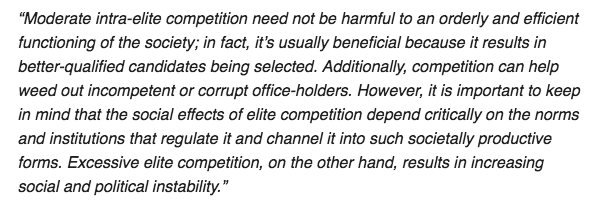A common mistake is to view elites as a unified block. A group of people who look out for one another. They are not. Elites are constantly trying to get ahead of one another /1
This is the idea of intra-elite competition. You can learn about this from books and articles by
@Peter_Turchin /2
@Peter_Turchin /2
The key idea of intra-elite competition is that competing “elite aspirants” are vying to obtain powerful positions.
Turchin notes that there are more wealthy people today as a proportion of the population today, relative to decades past /3
Turchin notes that there are more wealthy people today as a proportion of the population today, relative to decades past /3
For example, since 1983, the number of American households worth at least $10 million (in 1995 dollars) has grown from 66,000 to 350,000 /4
But there are limited powerful positions. There more rich people than before, but there are still only 100 senators and 435 representatives. Only 1 person can be president
And the number of influential positions in universities, media, and other elite organs is limited /5
And the number of influential positions in universities, media, and other elite organs is limited /5
Furthermore, money is not necessarily the key to elite status. If you win the lottery, you do not suddenly join the elite /6 https://twitter.com/robkhenderson/status/1273364050274107395?s=20">https://twitter.com/robkhende...
Think about the Varsity Blues scandal. Hollywood stars and rich celebs were willing to shell out large sums of money to get their kid into a top college.
For aspirational elites, money is less important than brand name colleges /7 https://twitter.com/robkhenderson/status/1260327409561120768?s=20">https://twitter.com/robkhende...
For aspirational elites, money is less important than brand name colleges /7 https://twitter.com/robkhenderson/status/1260327409561120768?s=20">https://twitter.com/robkhende...
Some interesting figures. The acceptance rate for the Stanford class of 1978 was 31 percent. Today the acceptance rate at Stanford is 4.3 percent.
The acceptance rate for the University of Chicago in 2005 was 40.3 percent. Today it is 5.9 percent /8
The acceptance rate for the University of Chicago in 2005 was 40.3 percent. Today it is 5.9 percent /8
The entryway to elite status is narrower.
When there are large numbers of frustrated elite aspirants—what Turchin refers to as elite overproduction—intra-elite competition intensifies /9
When there are large numbers of frustrated elite aspirants—what Turchin refers to as elite overproduction—intra-elite competition intensifies /9
Some competition is healthy. But vicious competition leads to the unraveling of social norms http://peterturchin.com/cliodynamica/intra-elite-competition-a-key-concept-for-understanding-the-dynamics-of-complex-societies/">https://peterturchin.com/cliodynam...
Large numbers of elite aspirants heighten intra-elite competition. As elites retire, spaces become available. Elite aspirants compete for those spots.
But there are always more elite aspirants than powerful positions. This gives rise to frustration among would-be elites /11
But there are always more elite aspirants than powerful positions. This gives rise to frustration among would-be elites /11
A great expansion in the numbers of elite aspirants with a narrow pool of powerful positions available means that large numbers of them will experience bitterness /12
The more ambitious elite aspirants who either do not obtain the positions they desire or do not see a path for themselves to earn positions they desire, become counter-elites.
They lead rebellion movements /13 https://twitter.com/robkhenderson/status/1260646105601064965?s=20">https://twitter.com/robkhende...
They lead rebellion movements /13 https://twitter.com/robkhenderson/status/1260646105601064965?s=20">https://twitter.com/robkhende...
Rebellion movements are typically led not by someone from the underclass, but by second-tier elites. America& #39;s founders, Lenin, Hitler, Mao, Pol Pot, Che Guevara etc. were educated and at least middle-class.
They were not nearly the poorest of their societies. Far from it /14
They were not nearly the poorest of their societies. Far from it /14
Challenging the elite is often an audition to become a member of the elite /15
When competent and ambitious people feel their odds of obtaining an elite position are narrowing, they will resort to drastic measures /16
Plainly, most of us vastly underestimate how much status games between elites determine what happens in the world /17
If you’re interested in human nature, check out my newsletter
Sign up here: http://eepurl.com/gNOyq5
-Social">https://eepurl.com/gNOyq5&qu... status
-Power dynamics
-Much more I can’t post about on Twitter
Sign up here: http://eepurl.com/gNOyq5
-Social">https://eepurl.com/gNOyq5&qu... status
-Power dynamics
-Much more I can’t post about on Twitter

 Read on Twitter
Read on Twitter


